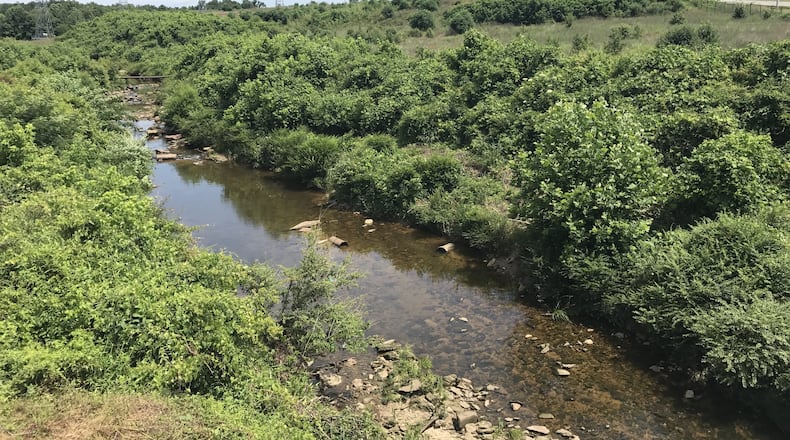In the past decade, Hartsfield-Jackson International has reported more than a dozen sewage spills, most of them into a creek flowing south from the airport through Clayton County.
The Georgia Department of Natural Resources’ Environmental Protection Division wants to fine the airport $22,914 for the discharges.
The fine would settle violations for 13 spills from the airport’s sanitary sewer system from 2010 through 2020. Ten of them were into Sullivan Creek, a tributary to the Flint River, including two that killed fish. In one case, sewage overflowed onto dry land.
It’s not typical for a Georgia EPD investigation to reach back 10 years, “but the fish kills prompted us to consider the history,” according to spokesman Kevin Chambers.
The volume of the spills, which were self-reported by the airport, ranged from 200 gallons to 2 million gallons. The incidents involved are: one in 2010, one in 2012, six in 2014, two in 2015, and one each in the years 2016, 2018 and 2020.
“That’s a relatively troubling pattern of repeated spills over a number of years,” said Ben Emanuel, American Rivers’ director of clean water supply.
The discharges had different causes, including equipment failures, pipe failures, power failures, vandalism, a contractor, debris, and rainy weather.
Airport officials say nearly five years ago, they began 24/7 monitoring of all of their lift stations, and in 2017 and 2018 the airport replaced and relined the pipe from a key lift station to the Flint River pump station.
“We constantly monitor and maintain our sanitary sewer lift stations,” Hartsfield-Jackson said in a written statement, adding that it “takes seriously its responsibility to follow the law and maintain a safe and sustainable environment around the airport.”
Credit: Source: Georgia Environmental Protection Division
Credit: Source: Georgia Environmental Protection Division
Hartsfield-Jackson is seeking Atlanta City Council approval to pay the money to resolve the violations.
Of the total, $20,550 would be to settle the 13 unpermitted discharges. Another $2,364 is to settle the two fish kills in Sullivan Creek. State code says anyone who intentionally or negligently spills sewage that causes pollution is liable for costs incurred by the state.
“I doubt that’s a deterrent for the airport. ... It doesn’t sound punitive to me,” said Hannah Palmer, coordinator of Finding the Flint, a project to restore the river and connect people to it through features like parks and trails.
She said such a penalty would not cover “those more difficult-to-identify quality-of-life sort of issues downstream.”
Some people across Georgia “believe that the river is tainted and polluted,” Palmer said. “That’s a harder thing to address with the settlement.”
In one discharge, 40,000 gallons of “blue water” aircraft lavatory waste spilled into the Flint River in 2010. The cause was unknown.
Georgia fisheries management staff discovered dead fish in Sullivan Creek in 2014 while investigating a 2 million gallon spill of raw sewage from a manhole into the creek near Riverdale Road and I-285. The mechanical on-off pump controls malfunctioned.
The sewage runoff “contained high amounts of organic materials, which resulted in suppressed levels of dissolved oxygen, therefore causing the fish kill,” according to the Georgia EPD report.
Credit: Source: Georgia Environmental Protection Division
Credit: Source: Georgia Environmental Protection Division
After a 2015 spill of 75,000-100,000 gallons of raw sewage, fisheries staff again discovered dead fish in Sullivan Creek and found that the creek “contained a light-gray water color, and a foul odor was noticeable throughout the fish kill zone.”
About the Author
The Latest
Featured





